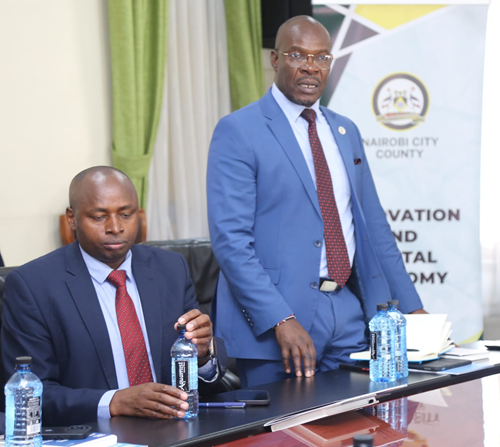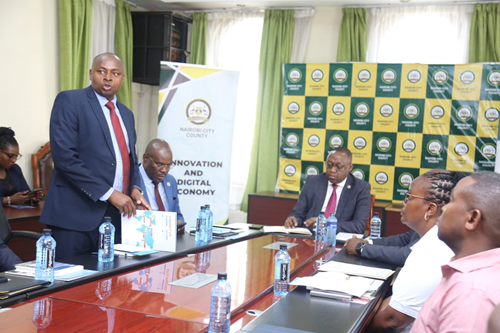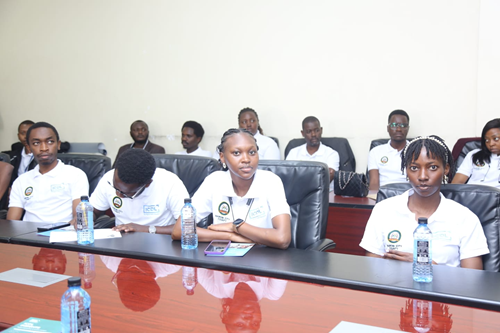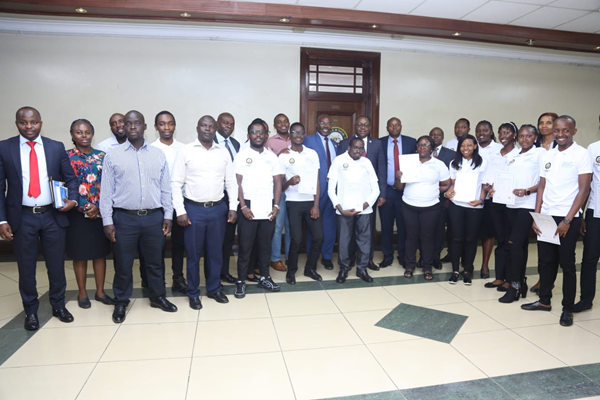Nairobi, 9th October 2024
H.E. Deputy Governor Njoroge Muchiri today presided over the graduation ceremony of Nairobi County’s first cohort of Trainer of Trainers (ToT).
In his address, Mr. Muchiri commended the Digital Economy and Start-ups Sub-sector for its pivotal role in enhancing service delivery through technological innovation. He stressed the importance of leveraging Fintech and digital solutions to streamline processes, ultimately improving services for Nairobi residents. He highlighted the County’s success in digitizing services, particularly the transformation of multiple permits into a unified business permit. This innovation, along with the NairobiPay platform, has significantly contributed to improving the efficiency of service delivery.
 “We have witnessed real progress,” Mr. Muchiri remarked. “Technology enables us to collect feedback more effectively, improving our interactions with Nairobi residents. We are committed to upskilling our staff, transferring this knowledge to the public, and encouraging self-service, which has increased the adoption of our digital services.”
“We have witnessed real progress,” Mr. Muchiri remarked. “Technology enables us to collect feedback more effectively, improving our interactions with Nairobi residents. We are committed to upskilling our staff, transferring this knowledge to the public, and encouraging self-service, which has increased the adoption of our digital services.”
While acknowledging the challenges that accompany digital transformation, Mr. Muchiri emphasized the importance of accountability. “As we advance our technological infrastructure, we must regulate its use to ensure it benefits all residents while preventing exploitation by bad actors.”
He urged the newly graduated trainers to continue evolving their expertise. “As technology evolves, so must our knowledge. Future innovations, such as artificial intelligence (AI), will be critical. However, AI is only as good as the data it uses. AI will not replace jobs but will shift opportunities to those who embrace it.”
 Chief Officer for Digital Economy and Startups, Mr. Sande Oyolo, underscored the county’s commitment to e-Learning and digital skilling. “One of our key goals is to roll out e-Learning programs. We believe that by enhancing digital literacy, more citizens will better understand and appreciate county digital services. This will increase demand for these services and help us further improve the quality-of-service delivery.”
Chief Officer for Digital Economy and Startups, Mr. Sande Oyolo, underscored the county’s commitment to e-Learning and digital skilling. “One of our key goals is to roll out e-Learning programs. We believe that by enhancing digital literacy, more citizens will better understand and appreciate county digital services. This will increase demand for these services and help us further improve the quality-of-service delivery.”
Mr. Oyolo further stated that digital skilling remains a priority for the sub-sector. With partners onboard, efforts to scale up these initiatives are underway. “We want more Nairobi residents to embrace digitization. As a county, we are proud to have achieved the highest revenue collection last financial year and largely attribute this to the digital services we have implemented.”
He also highlighted the role of the newly trained graduands in expanding digital literacy within the county, which will help reduce training costs and with more staff being trained, it will ensure that services are decentralized, making them more accessible at sub-county and ward levels, reducing the need for residents to visit City Hall.
Mr. Oyolo announced plans to establish innovation hubs in the boroughs, 17 sub counties and eventually in the 85 wards, in collaboration with Jamii Telecommunication Limited (JTL) and Uzuzi Hubs. These innovation centers will provide residents with access to training, job opportunities, and other digital services.
He concluded by urging the graduates to focus on promoting the effective use of digital skills for both commercial and personal development.
 Chief Officer for Smart Nairobi, Mr. Wilson Gakuya, praised the graduates, noting that their digital knowledge will play a vital role in elevating service delivery. “We believe digital systems and solutions are crucial in shaping Nairobi’s future. Smart solutions enhance visibility, foster accountability, and improve efficiency across our systems,” he added.
Chief Officer for Smart Nairobi, Mr. Wilson Gakuya, praised the graduates, noting that their digital knowledge will play a vital role in elevating service delivery. “We believe digital systems and solutions are crucial in shaping Nairobi’s future. Smart solutions enhance visibility, foster accountability, and improve efficiency across our systems,” he added.
Director of Digital Economy and Startups, Elizabeth Ndung’u, congratulated the graduates and encouraged them to embody key qualities such as flexibility, professionalism, and continuous self-development. “Our vision is much bigger, and we want to extend this training to other county staff and communities that need it most” she said.
Damien O’Sullivan, CEO of the ICDL Foundation who joined via online, highlighted the broader impact of digital competence. “This initiative is about more than just acquiring digital skills, it is about empowering Nairobi’s workforce to actively shape the future of the digital economy,” he said.
 Peter Maina, Regional Manager of ICDL Africa, emphasized the importance of both technological infrastructure and a digitally skilled population. He recognized the trainees’ achievements, who are now certified in 10 ICDL modules, and reaffirmed the societal impact of these skills. “Consumer training is as essential as infrastructure investment if we are to build a smart Nairobi. We are proud of Nairobi County being the first County to be accredited as a training and testing Centre for the ICDL Certification program.” He concluded.
Peter Maina, Regional Manager of ICDL Africa, emphasized the importance of both technological infrastructure and a digitally skilled population. He recognized the trainees’ achievements, who are now certified in 10 ICDL modules, and reaffirmed the societal impact of these skills. “Consumer training is as essential as infrastructure investment if we are to build a smart Nairobi. We are proud of Nairobi County being the first County to be accredited as a training and testing Centre for the ICDL Certification program.” He concluded.
John Wali, a representative from Uzuzi Hub, reinforced the importance of collaboration in digital empowerment. He shared Uzuzi Hub’s commitment to entrepreneurship and skill development and supporting the county in running startup competition held during Innovate Nairobi Tech Week 2024. “Our vision is to create centers of knowledge and skill training that prepare both current and future generations for the digital age,” he said, expressing Uzuzi Hub’s ongoing support for the county’s digital transformation.
The event was attended by Deputy Director of Vocational Training Leonard Mititi, ICDL representatives, Innovation and Digital Economy Sector Officers, and TVET Principals.
End/..

